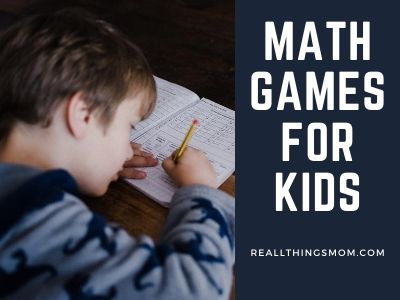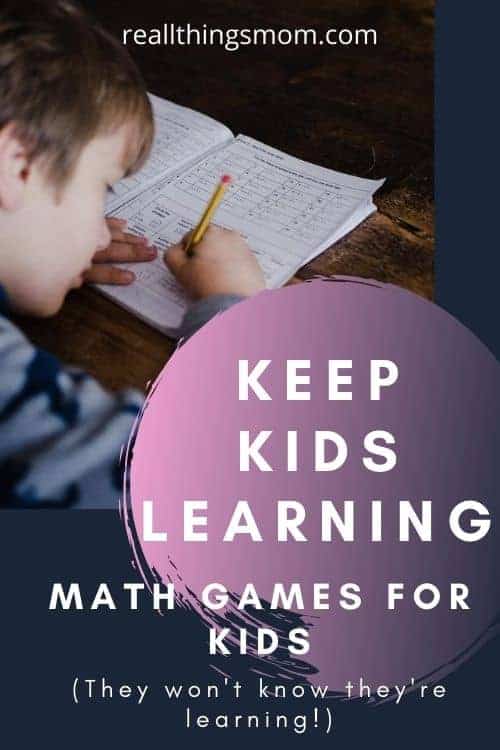
Today’s challenge is to have fun with math. For most of us, we know that this, indeed, is quite a challenge! During the school year, I have so many ideas for how to make math fun, but unfortunately, getting things done sometimes takes precedence. With so much to cover during the school year, we rarely have time for games anymore—especially with my teenagers in geometry and pre-algebra. Unfortunately, this lack of fun also makes my children not love math a whole lot, which is disappointing for me. But wait! It’s summer! We can incorporate these math games for kids into our family fun nights, and they’ll never know they’re doing math!
So, this is one of those challenges that is pretty important to me! I want to see my children enjoy math again. But it can be a challenge when you have a wide range of ages. It’s pretty difficult to find a math games for kids that are fun for both teenagers and toddlers! I tried very hard to choose math games that are inclusive of any-aged children so you can use them for your family, no matter where your kids fall into the mix.
- Farkle—
We love Farkle because it’s a quick, easy game that all of our children can play. Our youngest cannot do the math, but she can still learn to take turns. She can also understand that 300 is more than 100, so she can decide whether or not she wants to keep shaking. It’s great for math skills because it teaches kids to add quickly in their heads. The scorekeeper also has to do a little more advanced addition so older kids can take turns doing this.
- Backwards Farkle—
This is one of the best ways to play! For a couple of years, my sons struggled with subtracting numbers when you had to borrow from several places over. So, we started from 1000 and subtracted our scores until we got down to zero. (For more of a challenge, the first score is ends in 99 instead of 00. I.e. If the Farkle score is 500, we would just do 499 for the extra practice of subtracting and borrowing). This was such good and fun practice for them! Honestly, this is something they still need a refresher for once in a while, so it’s a great way to get them that extra practice, without it feeling like “doing math.”
- Math problem dice-game (each gets an age-appropriate problem sheet)—
This is best played in partners, but can also be done in groups of three. Each person has a sheet filled with level-appropriate math questions. (This is how you can easily make it all-inclusive.) One person begins the game by answering his/her math problems as quickly as possible. The other partner begins shaking a pair of dice. The person shaking the dice shakes until he gets a pair of anything and then the two trade. Now the one who began the game by shaking the dice is doing his math problems. The partners continue to alternate until one of them finishes the math problems. Whomever finishes first, is the winner.
You can have several sets of partners playing at the same time. Each set of partners, or small group can have its own winner, or you can all play against each other. This only works if everyone has a similar ability to roll the dice and switch places quickly (which may be difficult for young children to understand fully.)
- Make 10—
This is as basic as it sounds. You use any combination of cards in your deck to make 10. It’s obviously simple math for older players, but still a fun game that you can play as a family that includes young children. My older kids don’t want to play games like Crocodile Dentist or other toddler games so this card game bridges the gap. It also reviews those quick combinations that make 10 for adding up numbers quickly and practices “head math” for the older ones.
You can find complete directions and even a printable playmat, if you choose to use it, here.
Our family loves this book! I haven’t dug it out in a few years so when I pull it out, it’s going to be like brand new again, but this is a fun way to spend some time together. Now, I will say, this is definitely not going to be as much fun for younger children, as it’s more advanced math than most young children can understand. However, your young children might really enjoy just listening to the stories too and still feel like part of the “group.”
In any case, I give this math book high reviews, with no affiliation whatsoever at this point! (Man, I need to start getting paid for these reviews!)
See? Math can be fun! And if you work y of these math games into family fun night, they don’t even have to know they’re learning. My main problem is that I like to have control, which means I don’t like it when my kids keep score. It takes more patience. The game takes longer. One accuses the other of cheating. It’s annoying.
If you’re in that place right along with me, let’s challenge ourselves to see it as the investment that it is. If we let them learn to keep score, they can go off and play these games without us! They can entertain themselves, have fun together, give you some time to get your work done, and practice their math skills! That sounds like a win-win-win situation to me!
RElated: Science Experiments for Kids
